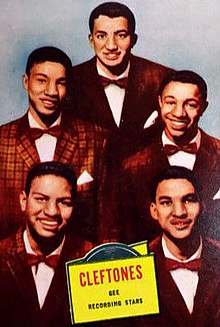The Cleftones were an American vocal group formed in 1955, who were then called The Silvertones at Junior High School 40 in Jamaica, Queens, New York City.[1]

Formation
editIn 1955, the members of the group were high school students attending Jamaica High School in Queens, New York.[1] The group initially formed around the idea of writing a political campaign jingle for Jamaica High School's Independent Party, an unpopular group of students "made up of people who were typically also-rans in all the school activities", which included future members of The Cleftones. With this aim, Herbie Cox (lead singer), along with classmates Charlie James McGhee (first tenor), Berman Patterson (second tenor), Warren Corbin (bass) and William "Buzzy" McClane (baritone), changed the lyrics to "Gee", a then-popular rhythm-and-blues song by The Crows. Performing their version of "Gee" resulted in making the Independent Party popular and winning the school elections. The group began performing locally as "The Silvertones" in a variety of neighborhood concerts, such as at Hillcrest Jewish Center Day Camp in Queens. The hit song "Gee" was originally produced by "gruff music industry legend" George Goldner, who also signed the group, now renamed "The Cleftones", to a recording contract in 1955.
Hits and recordings
editIn their first effort as professional musicians, Corbin and Patterson wrote "You Baby You," which became a hit in 1955.[1] Herb Cox then wrote "Little Girl of Mine" and "Can't We Be Sweethearts," for the group.[1] However, after a few minor hits ("Why You Do Me Like You Do" & "See You Next Year") their next major hits would not come until years later. In 1961 the second generation of The Cleftones included Herb Cox, Charlie James, Warren Corbin, Gene Pearson (baritone from The Rivileers who replaced baritone William "Buzzy" McClane) and new addition Pat Spann, the first and only female to sing with the group.[1] In 1961 they reached #18 on the Billboard Hot 100 chart with "Heart and Soul," a rearrangement of the 1938 song of the same name (a Number #1 by Larry Clinton and his orchestra, with Bea Wain on vocals).[2] The group followed that song with "For Sentimental Reasons" (1962), a rearrangement of a 1936 song of the same name.[2] However, the British Invasion of the mid-1960s took the audiences of The Cleftones and other doo-wop groups.[3] Gene Pearson left to sing with The Drifters from 1962 to 1966. The Cleftones broke up in 1964, three years after their "Heart and Soul" greatest success.[4]
In 2000, tenor Berman Patterson characterized his experience with The Cleftones:
It seemed like everybody and his brother had a singing group back in the '50s. I think we caught on because we didn't have that stereotypical rhythm-and-blues sound. We were bubblegum. Something bouncing and refreshing. But I'll tell you this: Once you got popular, you were expected to work. I can remember playing five shows a night at the Apollo Theater. We went on every hour and were paid $500 to split five ways.[5]
Lead singer Herb Cox (born Herbert Alexander Cox on May 6, 1938) died in Fayetteville, Georgia on December 7, 2019, at the age of 81.[6][7][8]
Songs featured in selected films
edit- "Can't We Be Sweethearts" appeared in the film Goodfellas.
- "Heart and Soul" appeared in the films American Graffiti, Mischief and Family Guy.
- "Little Girl of Mine" appeared in the film A Bronx Tale.
- "Lover Boy" appeared in the film Drive.
- "My Angel Lover" appeared in the film Susie Q.
References
edit- ^ a b c d e Colin Larkin, ed. (1997). The Virgin Encyclopedia of Popular Music (Concise ed.). Virgin Books. pp. 270/1. ISBN 1-85227-745-9.
- ^ a b "Golden Oldies Take Stage At Chasco Fiesta", Tampa Tribune, sec. Pasco, p. 3, April 4, 2008, archived from the original on February 16, 2013, retrieved February 1, 2013
- ^ Wayne Robins (January 18, 1991), "Pop Music Carnegie Hall's Hosting The Cleftones Rocking Since A '50s Romp", Newsday, sec. Part II/Weekend, p. 91
- ^ Stephen Thomas Erlewine (2003). Vladimir Bogdanov (ed.). All Music Guide to Soul: The Definitive Guide to R&B and Soul. Hal Leonard Corporation. p. 141. ISBN 0879307447. Retrieved February 2, 2013.
- ^ Garret Mathews (January 14, 2000), "Times Have Changed For 'Sam' Samudio, Berman Patterson", Evansville Courier & Press, sec. Metro, p. B1
- ^ "Herbert Alexander Cox". Retrieved February 22, 2020.
- ^ "HERB COX DIES..." Soulandjazzandfunk.com. Retrieved December 31, 2019.
- ^ "Respect 2019". Soulwalking.co.uk. Retrieved December 31, 2019.